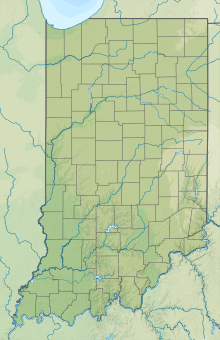
Back معركة تيبكانو Arabic Типпекану патĕнчи çапăçу CV Schlacht bei Tippecanoe German Batalla de Tippecanoe Spanish Tippecanoe lahing Estonian Bataille de Tippecanoe French קרב טיפקאנו HE Pertempuran Tippecanoe ID Battaglia di Tippecanoe Italian ティペカヌーの戦い Japanese
| Battle of Tippecanoe | |||||||
|---|---|---|---|---|---|---|---|
| Part of American Indian Wars and Tecumseh's War | |||||||
 19th-century depiction by Kurz and Allison, American troops under the leadership of General William Henry Harrison fighting the Indian forces of The Prophet, Tenskwatawa (the brother of Tecumseh) in a forest. | |||||||
| |||||||
| Belligerents | |||||||
| Tecumseh's Confederacy | United States | ||||||
| Commanders and leaders | |||||||
| Tenskwatawa | William Henry Harrison | ||||||
| Strength | |||||||
| 500–700 warriors |
250 infantry, 90 cavalry, 700 militia | ||||||
| Casualties and losses | |||||||
|
Unknown 36 known dead (Estimated 50–65 killed and 70–80 wounded)+ 1 POW |
62 killed, 126 wounded | ||||||
Location within Indiana | |||||||
The Battle of Tippecanoe (/ˌtɪpəkəˈnuː/ TIP-ə-kə-NOO) was fought on November 7, 1811, in Battle Ground, Indiana, between American forces led by then Governor William Henry Harrison of the Indiana Territory and tribal forces associated with Shawnee leader Tecumseh and his brother Tenskwatawa (commonly known as "The Prophet"), leaders of a confederacy of various tribes who opposed European-American settlement of the American frontier. As tensions and violence increased, Governor Harrison marched with an army of about 1,000 men to attack the confederacy's headquarters at Prophetstown, near the confluence of the Tippecanoe River and the Wabash River.
Tecumseh was not yet ready to oppose the United States by force and was away recruiting allies when Harrison's army arrived. Tenskwatawa was a spiritual leader but not a military man, and he was in charge. Harrison camped near Prophetstown on November 6 and arranged to meet with Tenskwatawa the following day. Early the next morning warriors from Prophetstown attacked Harrison's army. They took the army by surprise, but Harrison and his men stood their ground for more than two hours. After the battle, Harrison's men burned Prophetstown to the ground, destroying the food supplies stored for the winter. The soldiers then returned to their homes.
Harrison accomplished his goal of destroying Prophetstown. The win proved decisive and garnered Harrison the nickname of "Tippecanoe". Meanwhile, the defeat dealt a fatal blow for Tecumseh's confederacy and, though comeback attempts were made, it never fully recovered.[1][2] So popular was Harrison’s nickname that the Whigs turned "Tippecanoe and Tyler too" into the slogan and a popular song for Harrison and his running mate John Tyler's 1840 presidential campaign.
- ^ Blaine T. Brownell; Robert C. Cottrell (2010). Lives and Times: Individuals and Issues in American History: To 1877. Rowman & Littlefield. p. 130. ISBN 9781442205581.
- ^ Spencer C. Tucker (2014). Battles That Changed American History: 100 of the Greatest Victories and Defeats. ABC-CLIO. p. 83. ISBN 9781440828621.
© MMXXIII Rich X Search. We shall prevail. All rights reserved. Rich X Search

